As the merger between Hawaiian Airlines and Alaska Airlines approaches, travelers and the Hawaii travel industry are bracing for what has the potential to be a significant clash of cultures.
This merger draws attention because of its strategic implications for the U.S. aviation market and the cultural integration challenges it may pose—lessons that can be drawn from Alaska’s previous acquisition of Virgin America as well as other high-profile airline mergers.
“It’s going to be difficult to merge two completely different corporate cultures. The ride is going get bumpy over the next couple of years. How Alaska is going to handle it while facing a probable economic slowdown in the near future is going to be “interesting.” Popcorn anyone?”
Regular reader and commenter Jay H.
The Alaska-Virgin America merger: lessons in cultural integration.
When Alaska Airlines acquired Virgin America in 2016, it began a challenging integration process. With its chic, tech-forward approach and trendy consumer-centric branding, Virgin America attracted a younger demographic that valued its unique in-flight experience.
In contrast, Alaska Airlines built its solid reputation on traditional values like reliability, efficiency, technology, and customer service.
Despite initial efforts to retain Virgin America’s brand identity, including considerations of running the two airlines as separate brands, Alaska soon decided to fully integrate and retire first, the Virgin America brand, and later, its fleet of aircraft.
Many of Virgin’s loyal customers were disappointed by this decision, feeling that the airline’s distinctive character had been lost in the process. The merger highlighted the difficulties of blending two different corporate cultures, particularly when one is deeply associated with innovation and modernity and the other is arguably more focused on tradition and culture.
While ultimately successful in business terms, Alaska’s approach to integrating Virgin America serves as a cautionary tale for its upcoming merger with Hawaiian Airlines. The key takeaway is that cultural differences, if not carefully managed, can lead to dissatisfaction among both customers and employees, potentially undermining some key benefits of the merger.
Alaska has very different plans for this acquisition.
Alaska has indicated that Hawaiian would remain indefinitely as a separate brand, post-merger. Alaska indicated when they acquired Virgin America that they “would consider” keeping that brand. In the end, that turned out not to be the case. At that time the company said, “We are looking at that because we do believe in the power of the Virgin America brand, and we don’t want to lose all that loyalty and revenue that exists today… [we are] taking a good look at running two brands for some period of time, perhaps forever.”
Beat of Hawaii
To that point, Alaska told Beat of Hawaii,
“We never committed to keeping the VX brand – only to considering it. It’s a very different set of facts in this case with HA.”
Hawaiian Airlines: a deeply rooted, unique local culture.
Hawaiian Airlines represents a unique challenge for Alaska. The airline is deeply embedded in Hawaii’s local culture, emphasizing community, tradition, and the Aloha spirit. Hawaiian Airlines has long been a symbol of the islands, offering a travel experience that reflects the values and hospitality of Hawaii. However, this strong cultural identity also comes with challenges, particularly in areas where the airline has been slow to modernize its operations, technology, and some would add people.
Alaska Airlines, known for its efficiency and modern approach, now faces the task of integrating Hawaiian Airlines into its system without alienating the very aspects that make Hawaiian unique.
Given Hawaiian Airlines’ strong local roots and Alaska’s more expansive, continental focus, the cultural differences between the two airlines could be even more pronounced than those seen in the Virgin America merger.
Comparisons to Air France-KLM and other mergers.
The cultural challenges expected in the Hawaiian-Alaska merger are reminiscent of those experienced by Air France-KLM, where national differences between French and Dutch employees have created ongoing tension since their 2004 merger. A recent study highlighted that these cultural differences have made cooperation difficult, with French employees often viewing their Dutch counterparts as overly focused on profits. At the same time, the Dutch see the French as overly hierarchical.
Similarly, the challenges faced by other airline mergers, including United and Continental, Lufthansa, Swiss and others, demonstrate that cultural clashes can significantly impact the success of a merger if not carefully managed. These examples emphasize the importance of cultural due diligence and the need for a thoughtful approach to integration, which goes beyond mere aligning of operations and finances.
Hawaiian’s employees have never answered to anyone outside of Hawaii. Being part of a company headquartered primarily 2,500 miles away in the Pacific Northwest will be a huge shift. That, before much-needed changes at Hawaiian even begin.
The road ahead: balancing long-standing tradition with modernity.
As Alaska Airlines moves forward with its acquisition of Hawaiian Airlines, the airline must carefully navigate the integration of Hawaiian’s 95-year old cultural identity with Alaska’s more modern, efficiency-driven approach. The success of this merger will likely hinge on Alaska’s ability to respect and preserve the unique elements of Hawaiian Airlines that resonate with its employees and customers, while also bringing the airline up to speed with modern technological and operational standards.
In conclusion, while this merger’s financial and strategic benefits are easier to understand, another true test will be in how well Alaska Airlines can manage the cultural integration. Lessons from past mergers, such as Alaska-Virgin America and Air France-KLM, may provide valuable insights into the challenges ahead.
The industry will be watching closely to see whether Alaska can create a unified airline that honors the legacies of both brands or if cultural differences will once again prove to be a stumbling block.
Get Breaking Hawaii Travel News
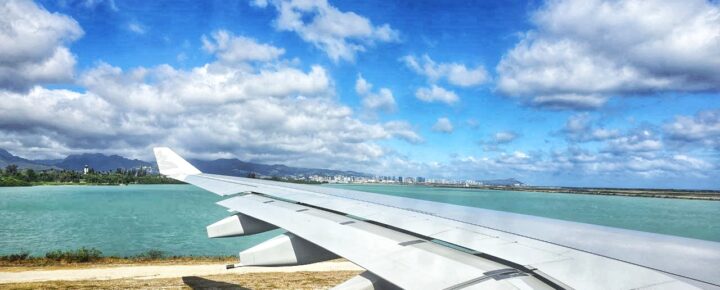
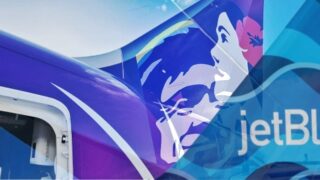
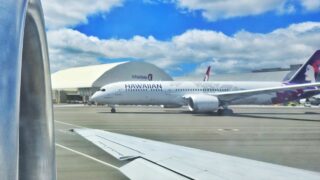
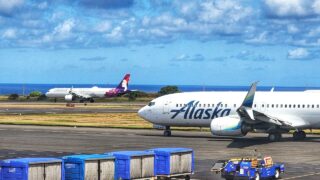
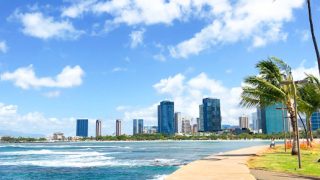
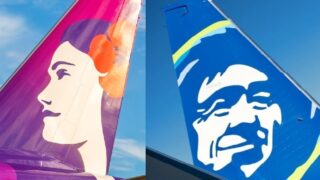

As Alaska considers how to navigate the waters of the “merger,” they really do need to be careful not to alienate the Hawaiian population. Since we have been traveling often since 2018 to visit family we have met many of the their friends and neighbors as well as friends of friends. I would be willing to say that close to 20% of the Maui population has either worked or is close with someone who has worked for Hawaiian over the past 50 years!
Although there are cultural differences between the two companies, the values each company holds to it’s region are similar. The contrast isn’t as great as comparing cultures/values of Hawaiian Air vs. almost all other US airlines.
It is beyond my understanding why the discussion and negotiations swirlling about the proposed Alaska Air/Hawaiian Air merger have been somewhat void of any consideration of cross-cultural considerations. As a former 20-plus years Alaska resident who spent many years and miles flying in and around Alaska, I learned first-hand just how much Alaska Airlines has always cared about Alaskans, particularly Alaska natives, thkough I was an “Outsider” (a person eminating from elsewhere, mostly the “lower 48” states). My best example is my former Alaska neighbor’s son from a wonderful Eskimo family and who grew up as a playmate to my sons and who now is an Alaska Airlines line pilot. This is why I consider Alaska Airlines to be part of my family. Nowhere else in my experience have I ever considered corporate employees as extended family. Different but true. In my family’s recent travels we see our former neighbor flying around the Alaska system. If this seems like family, it is!
That’s a great point Jim, one more great example of what makes this merger unique. These are two airlines that not only greatly compliment each other with their respective route structures and shared experiences of being the high quality survivor competing with much larger carriers, they have strong cultural similarities as the local carrier that has always been there for their respective home States. The fact that a Seattle based Airline can be the local carrier in Alaska bodes well for Hawaii and the Pacific legacy Hawaiian brings to the table. This was the only merger combination that could have worked for Hawaiian, be interesting to see if goes as it should.
Every BOH reader can now push their chips to the middle of the table and weigh in. Here’s my bet: Hawaiian becomes the budget alternative to Alaska. That doesn’t mean flights will be cheaper on Hawaiian than they are now. Alaska will up their level of service and seating choices and raise rates accordingly. It has already started -Exit rows from the mainland are now pricier than Premium. Hawaiian may see operational streamlining as redundancies are eliminated, but I just don’t see their fleet as malleable as Alaska’s. Let’s meet here in two years and see who was closest.
I’ll see your bet and raise it Maleko, I say the Hawaiian/ Alaska combo will be a unique brand that offers superior service across the entire system.
It will be known as the quality alternative to the big four regardless of which carrier you choose. The synergies of the two will make both even better. Gonna be very interesting whatever happens!
Alaska airlines aquired Horizon Airlines which is a Portland regional carrier years ago. Horizon flys to Seattle,Reno, and I think a few locations in California. They are still around and participates in some of the short flights out of PDX that Alaska books. They are still around and has never changed their name. I guess this is a different situation than Virgin Airlines.
I heard on the news that Alaska has around 50 homeless in or around Anchorage a year. They will offer a one way ticket to anywhere in the states up to 279 dollars to relocate in saving the cost of 300 a month that it costs the state to house and feed them. Wait till the flight ANK-HNL is available and see how many homeless Hawaii gets a month in keeping these individuals from passing away in the -40 degree temperates at night. Alaska State gets deals by Alaska Airlines so maybe we will see snow machines on the beaches too. Hawaii state assistance here I come.
Hopefully, nothing more than a nuisance, but United has filed an objection to the merger. Also, a question: any insight regarding Alaska deep-sixing the Philippines call center…and the Airbus A321 and A330 maintenance facility?
Mahalo for BoH best in class Hawaii information.
Oh, come on.
The only “culture” that matters is a culture that makes a profit. Virgin America didn’t have it. Hawaiian doesn’t have it. Why would you buy a money-loosing airline and keep the culture that led the stockholders to sell it?
Alaska will definitely keep the Hawaiian brand because it makes sense. Nobody’s going to buy a ticket on a plane from Seoul to Honolulu that has an Eskimo on the tail. Likewise, while the Alaska brand is valuable on the West Coast, nobody’s going to fly from Washington, New York, or Boston to Hawaii on a plane with an Eskimo on the tail.
Interisland was already a losing proposition before Southwest came. If it weren’t, United would have done it years ago. Southwest only made it worse by flooding the market with seats because they rotate aircraft back to the maintenance, rather than establish a Hawaiian maintenance base to service a sub-fleet that gets the daylights beat out of it
In addition, I would submit that far more important than simple balance sheets is the synergies that combining these two airlines create. Management of both companies seem sincere in preserving Hawaiians legacy and experience. In answer to the few angry ex VA folks that have chimed in, this merger has few similarities to that merger. Hawaiian’s image and experience in the Pacific is a very powerful marketing tool and will give AS/HA a strong advantage in whatever they decide to do in the Pacific. They can continue to dominate inter island and benefit immensely when the Asia traffic finally returns as well as have an advantage in any new market they enter. “If” they do as they appear to be planning, maximize what Hawaiian brings to the table, they stand to be one of the industries merger success stories.
I would submit the biggest driver in the success of this merger will be the combining of the two labor groups. As USAir/AmWest demonstrated it can be lethal.
HA/AS combines two very similar labor that are the only legacy survivors of the deregulation era without becoming one of the “Big Four”. They have fought similar battles over the years and both groups have a reputation of superior service and a quality product. What bodes well is the high level of mutual respect both groups seem to be exhibiting to the deal(I know many employees of both). We’ll see if that spirit continues to the benefit of both. They need each other to continue being the quality alternative to the big four.
This makes me very sad. I’ve been a Hawaiian airlines flyer for 40 plus years. You know they can say anything now but there’s no way they can integrate the two cultures. Knowing the nativeness of both cultures they’re unique how can successfully integrate two different beautiful cultures just because you want to and say you will? So sorry
Alaska has native Eskimo’s and live in severe cold weather. Hawaii has native Islanders that live in the tropical heat. That is a clash in it’s own so IMO Alaska will be true to it’s roots and aquiring Hawaiian Airlines is just a business ordeal.
I’m flattered by the recognition! However, I don’t think I’m understating the problems that this merger (if it is realized) will cause in terms of culture crashes and integration problems between the two airlines as they try to become one – even as Alaska insists that they will remain two separate brands. Hawaiian is a purely island based institution, and let’s face it. Hawaii isn’t necessarily a part of mainstream reality – by any measure of CONUS GAAP’s. Business wise, personnel policies, or otherwise… AK on the other hand, is a true corporate, profit and efficiency focused concern. The battlefield has been set, the outcome remains to be seen… I truly wish them the best of luck…
Best Regards
Aloha – Alaska will be changing everything over time and won’t be running to two separate airlines, probably keep the Hawaiian name. If Alaska doesn’t buy Hawaiian, Hawaiian will close down. Alaska is the best option to keep Hawaiian running but under Alaska’s terms.
Just to clarify J…what’s at stake is the possibility of C11 reorganization, not Hawaiian Shutting down
I am hopeful that the Aloha spirit and Hawaiian flavor of the flights to and from Hawaii will remain…I did just buy a pareo from TagAloha that was a collaboration with Hawaiian Airlines and I took the magazine home on our flight last week…just in case it’s the end of an era 🙂 I know I will miss the really good pricing on Hawaiian Airlines!
I’m from a very small island in Alaska where Alaska Air had/has a monopoly. Prices were always high, such as 1984 a r/t 2.5 hour flight to Seattle was $600.00, but I do think if anyone understands cultural significance this would be a good merger. AK Air still has Chester on the tale and serves many Alaskan indigenous communities. I hope this would make them feel a sense of kuleana to Hawaii.
Sorry, but if there is a perceived reason there was a clash of cultures with Virgin America was maybe because they were “really not all that,” at Virgin America as much as they thought. Yes there were some that excelled like some excel at most airlines, but in terms of customer service, Alaska far exceeds the Virgin experience in terms of consistency, customer care, and lack of attitude.
Hawaiian seems to have way more the work ethic and customer focus similar to that of Alaska I might add.
My experience tells me there’s no merging cultures…one will dominate. Buckle your seat belts.
Hawaiian Airlines could definitely benefit from a technology upgrade. The botched rollover of the reservations system left a complete mess, along with apps and a website that are vastly inferior to almost all other airlines. That’s not a Hawaiian cultural issue. That’s a core competency issue, which Hawaiian sorely lacks. There’s no shortage of talented people who might have managed a tech upgrade. I suspect it was simply a lack of will or competency among the management ranks.
Another potential benefit would be dumping Hawaiian’s offshore customer service center in favor of a staff empowered to actually solve problems.
If Alaska is smart, they will ensure that cultural issues remain in Hawaiian hands.
I can assure you that those of us that were loyal to Virgin America, often paying more for the experience, will be watching this like a Hawk. Alaska bumbled and ruined that whole acquisition. They overlooked the “younger” professional customers, often with expendable income, was lost on old, stuffy Alaska executives. I promise you this; if they do the same to Hawaiian, which enjoys a similar ridership from the mainland (think Silicon Valley visitors they’re targeting and paying $1000/night hotel rates) there will be similar backlash. I can tell you that I was so dismayed and mad I moved my business/personal travel to United/Hawaiian just to spite Alaska’s gigantic fumble with Virgin.
I like Alaska and Hawaiian Airlines. I hope the merger of two likes doesn’t equal one dislike! Just sayin!
Why Don’t SWA Buy Hawaiian?
Wanna talk about a clash of cultures…
yuck
Rule #1 – Don’t buy other peoples problems.